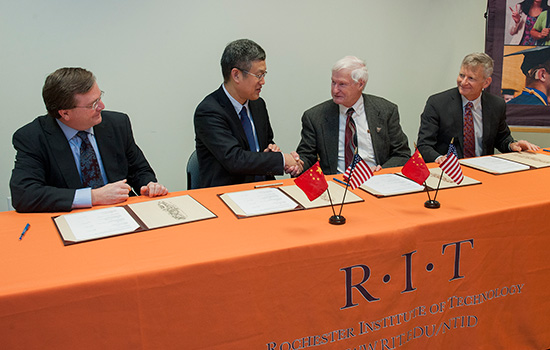RIT expands agreement with University in China
Agreement develops collaborations with RIT’s microelectronic engineering program, continues relationship with NTID
Mark Benjamin
Officials from RIT and Tianjin University of Technology of China attended a formal signing ceremony on Friday. Tianjin University of Technology, a nationally recognized leader for its programs in engineering, technology and the arts and the first technological university providing education for the deaf in China, has entered into new partnership agreements to enroll students in one- and two-year programs at RIT’s Kate Gleason College of Engineering and the National Technical Institute for the Deaf.
Tianjin University of Technology of China, a nationally recognized leader for its programs in engineering, technology and the arts and the first technological university providing education for the deaf in China, has entered into new partnership agreements to enroll students in one- and two-year programs at RIT’s Kate Gleason College of Engineering and the National Technical Institute for the Deaf (NTID).
Tianjin University of Technology has been a longtime partner of NTID, and representatives visited RIT as an opportunity to review and confirm details related to these new agreements. A formal signing ceremony took place Friday, Dec. 9.
Representatives from Tianjin University of Technology attending the signing ceremony included the university’s vice president, head of the technical college for the deaf, head of the school of engineering and the associate director of the Office of International Relations.
RIT President Bill Destler, RIT’s Provost and Vice President for Academic Affairs Jeremy Haefner and NTID President and RIT Vice President and Dean Gerry Buckley represented RIT.
“RIT/NTID has had an outstanding relationship with Tianjin University of Technology since 2001,” said Buckley. “We consider Tianjin University of Technology a ‘sister college’ and are excited to expand and develop additional partnerships throughout other areas of RIT.”
NTID is the first and largest technological college for deaf and hard-of-hearing people in the world, and has formal relationships with colleges and universities in Japan and Russia, in addition to Tianjin University of Technology.
RIT established the first undergraduate microelectronic engineering program in 1982 to address the need for engineers trained in micro-fabrication for the growing semiconductor industry. The program combines imaging science and a strong core of electrical engineering.
“Advanced microelectronic manufacturing already has changed the world, and this developing relationship will have an impact as we continue into the future,” said Robert Pearson, director of RIT’s microelectronic engineering programs. “I find it amazing that two universities a world apart share such similar attributes and goals.”












